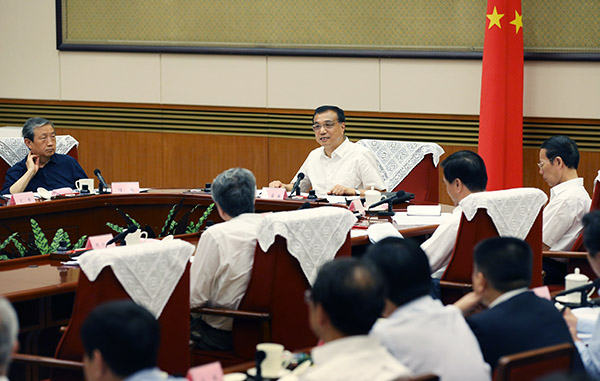Li calls on SOEs to keep 'going global'
China Daily, September 22, 2015 Adjust font size:
|
|
|
Chinese Premier Li Keqiang presides over a meeting on reforms of state-owned enterprises (SOEs) in Beijing, capital of China, Sept 18, 2015. Chinese Vice Premier Zhang Gaoli also attended the meeting. [Photo/Xinhua] |
Premier Li Keqiang has encouraged State-owned enterprises to play a key role in the drive by the nation's industries to "go global", and make the most of their financial and technological advantages as they step up their international cooperation.
The SOEs should be effective in tapping the global market and making the most of both domestic and international resources, he told a seminar on SOE reform on Friday.
"Chinese SOE's participation in global cooperation on production capacity, especially through the newly introduced Silk Road Economic Belt and the 21st Century Maritime Silk Road, will benefit not only the Chinese economy but also other economies."
The event was held after China's central authorities unveiled a guideline last Sunday to deepen reforms of SOEs as the latest move to invigorate the mammoth State sector. It was attended by more than 100 ministers and executives of major centrally administered and local SOEs.
As the world's second-largest economy is facing a slowdown in growth and unprecedented fiscal revenue pressure, Li stressed," the State sector should shoulder its responsibility in addressing the emerging challenges."
The country now has 111 central SOEs under the State-owned Assets Supervision and Administration Commission, or SASAC. With around 25,000 SOEs owned and managed by local governments, the State sector employs nearly 7.5 million people.
The premier said the SOEs still suffer from systematic faults, mechanism malfunctions and poor management despite their great contribution to the country's economic development.
SOEs were hit by declining profits and increased losses since the beginning of this year, he added.
In the first half of this year, the profits of the country's central SOEs fell by 3.1 percent year-on-year, a sign of the downward pressure on the Chinese economy, which recorded year-on-year growth of 7 percent in the first six months.
Li suggested that SOEs can cultivate more growth points in wider opening-up as they boast competitive edges in a number of sectors such as engineering and machinery, energy, nuclear power and telecommunications.
They should form the backbone of the global expansion drive by Chinese industries and competition with multinationals, the premier said.
According to SASAC, 107 central SOEs had established 8,515 overseas branches in 150 countries and regions by the end of 2014, with their overseas assets totaling 4.9 trillion yuan ($790 billion).
The premier also called for increased cooperation between Chinese SOEs and foreign firms from developed nations through purchasing their core technologies, key parts and components to jointly explore third-party markets.
He cited a proposed joint fund to be set up by China and France by November as a successful example of global cooperation by combining China's production capacity with advanced technologies from France.
SASAC Chairman Zhang Yi said SOEs will engage in more overseas mergers and acquisitions and establish more global platforms for industrial cooperation to further promote Chinese equipment abroad.
Construction chief springs a surprise on premier
Meng Fengchao, chairman of China Railway Construction Corp Co Ltd, hadn't expected to surprise Premier Li Keqiang when he complained to him about disorder in the Chinese construction market at the seminar on SOE reform.
He asked for better regulation of the market, saying that entry barriers set up by some local governments had undermined the operating environment.
One of these barriers, according to Meng, is the compulsory establishment of a branch company by any construction firm that wins the bidding for a project in a province or city where it is based.
Meng said his company, one of China's biggest construction contractors, has had to set up more than 700 branch companies nationwide in an attempt to comply with this "unreasonable" rule.
On hearing Meng's complaint, the premier intervened to ask for a reply from an official at the Ministry of Housing and Urban-Rural Development.
The official said, "Our ministry has just launched the latest round of plans to regulate local governments' malpractices of imposing entry barriers in the construction market."
However, Meng continued with his complaint.
"Premier, my company is also suffering (from having to make) numerous kinds of deposits. My goodness, it's too much!" he said to laughter from all those present.
Meng explained that construction companies need to lodge financial deposits for bidding, quality control, employees' salaries, registration and work safety. On average, these deposits account for nearly 30 percent of the company's contract value each year.
"Even I cannot name all the deposit items," he said with a sigh.
The premier appeared surprised to hear that so many kinds of charges are required from a construction company.
He demanded prompt action from the Ministry of Finance to help clean up the market.
"In reality, they are excessive charges for a construction company under the disguise of deposits," he said. "They have pushed up the costs of these companies and further reduced their profits.
"How can we manage to achieve economic growth and improve people's well-being if the company cannot survive?" the premier asked.
